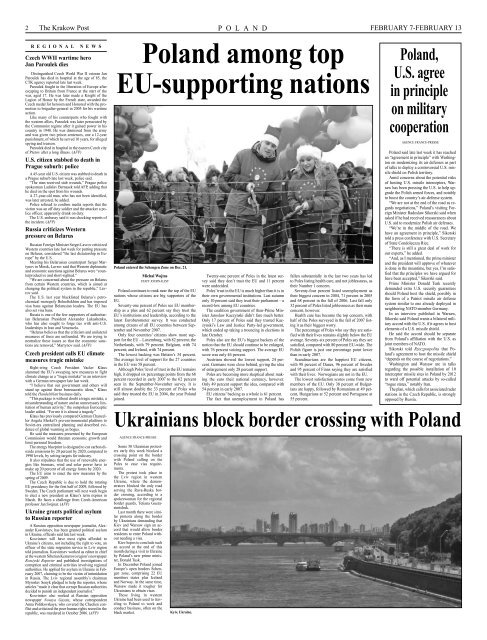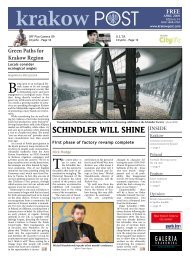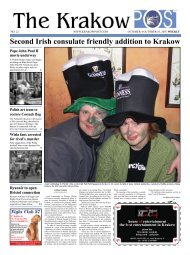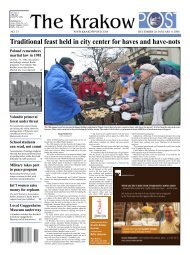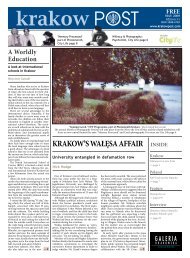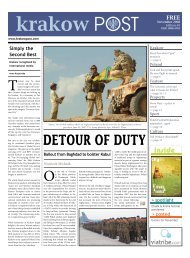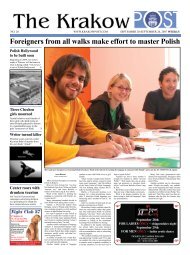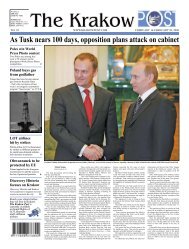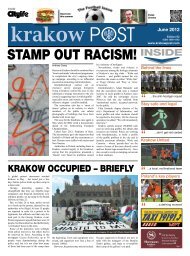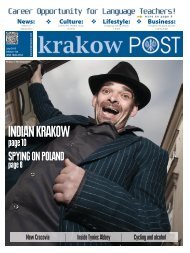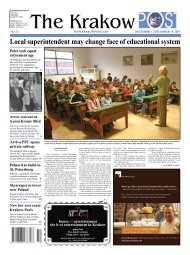Poland looks to Silesia for energy diversification - Krakow Post
Poland looks to Silesia for energy diversification - Krakow Post
Poland looks to Silesia for energy diversification - Krakow Post
Create successful ePaper yourself
Turn your PDF publications into a flip-book with our unique Google optimized e-Paper software.
2<br />
The <strong>Krakow</strong> <strong>Post</strong><br />
P O L A N D<br />
FEBRUARY 7-FEBRUARY 13<br />
R E G I O N A L N E W S<br />
Czech WWII wartime hero<br />
Jan Paroulek dies<br />
Distinguished Czech World War II veteran Jan<br />
Paroulek has died in hospital at the age of 85, the<br />
CTK agency reported late last week.<br />
Paroulek fought in the liberation of Europe after<br />
escaping <strong>to</strong> Britain from France at the start of the<br />
war, aged 17. He was later made a Knight of the<br />
Legion of Honor by the French state, awarded the<br />
Czech medal <strong>for</strong> heroism and Honored with the promotion<br />
<strong>to</strong> brigadier-general in 2005 <strong>for</strong> his wartime<br />
action.<br />
Like many of his counterparts who fought with<br />
the western allies, Paroulek was later persecuted by<br />
the Communist regime after it gained power in his<br />
country in 1948. He was dismissed from the army<br />
and was given two prison sentences, one a 12-year<br />
punishment, of which he served 10 years, <strong>for</strong> alleged<br />
spying and treason.<br />
Paroulek died in hospital in the eastern Czech city<br />
of Prerov after a long illness. (AFP)<br />
U.S. citizen stabbed <strong>to</strong> death in<br />
Prague suburb: police<br />
A 45-year old U.S. citizen was stabbed <strong>to</strong> death in<br />
a Prague suburb late last week, police said.<br />
“The man received stab wounds,” Prague police<br />
spokesman Ladislav Bernasek <strong>to</strong>ld AFP, adding that<br />
he died on the spot from his wounds.<br />
A 27-year-old man, who has not been identified,<br />
was later arrested, he added.<br />
Police refused <strong>to</strong> confirm media reports that the<br />
victim was an off duty soldier and the attacker a police<br />
officer, apparently drunk on duty.<br />
The U.S. embassy said it was checking reports of<br />
the incident. (AFP)<br />
Russia criticizes Western<br />
pressure on Belarus<br />
Russian Foreign Minister Sergei Lavrov criticized<br />
Western countries late last week <strong>for</strong> putting pressure<br />
on Belarus, considered “the last dicta<strong>to</strong>rship in Europe”<br />
by the U.S.<br />
Meeting his Belarusian counterpart Sergei Martynov<br />
in Minsk, Lavrov said that Western diplomatic<br />
and economic sanctions against Belarus were “counterproductive<br />
and short-sighted.”<br />
“We are concerned about the pressure on Belarus<br />
from certain Western countries, which is aimed at<br />
changing the political system in the republic,” Lavrov<br />
said.<br />
The U.S. last year blacklisted Belarus’s petrochemical<br />
monopoly Belneftekhim and has imposed<br />
visa bans against Belarusian leaders. The EU has<br />
also set visa bans.<br />
Russia is one of the few supporters of authoritarian<br />
Belarusian President Alexander Lukashenko,<br />
who has also sought <strong>to</strong> <strong>for</strong>ge ties with anti-U.S.<br />
leaderships in Iran and Venezuela.<br />
“Belarus believes that the criticism and unilateral<br />
measures of <strong>for</strong>ce are unfounded. We are trying <strong>to</strong><br />
neutralize these issues so that the economic sanctions<br />
are removed,” Martynov said. (AFP)<br />
Czech president calls EU climate<br />
measures tragic mistake<br />
Right-wing Czech President Vaclav Klaus<br />
slammed the EU’s sweeping new measures <strong>to</strong> fight<br />
climate change as a “tragic mistake” in an interview<br />
with a German newspaper late last week.<br />
“I believe that our government and others will<br />
stand up against these bureaucratic ideas,” Klaus<br />
<strong>to</strong>ld the Handelsblatt business daily.<br />
“This package is without doubt a tragic mistake, a<br />
misunderstanding of nature and an unnecessary limitation<br />
of human activity,” the outspoken Euroceptic<br />
leader added. “For me it is almost a tragedy.”<br />
Klaus has previously compared German Chancellor<br />
Angela Merkel’s pro-environmental plat<strong>for</strong>m <strong>to</strong><br />
Soviet-era centralized planning and described evidence<br />
of global warming as bogus.<br />
He said the measures presented by the European<br />
Commission would threaten economic growth and<br />
limit personal freedom.<br />
The <strong>energy</strong> blueprint is designed <strong>to</strong> cut carbon dioxide<br />
emissions by 20 percent by 2020, compared <strong>to</strong><br />
1990 levels, by setting targets <strong>for</strong> industry.<br />
It also stipulates that the use of renewable energies<br />
like biomass, wind and solar power have <strong>to</strong><br />
make up 20 percent of all <strong>energy</strong> <strong>for</strong>ms by 2020.<br />
The EU aims <strong>to</strong> enact the new measures by the<br />
spring of 2009.<br />
The Czech Republic is due <strong>to</strong> hold the rotating<br />
EU presidency <strong>for</strong> the first half of 2009, followed by<br />
Sweden. The Czech parliament will next week begin<br />
<strong>to</strong> elect a new president as Klaus’s term expires in<br />
March. He faces a challenge from Czech-American<br />
professor Jan Svejnar. (AFP)<br />
Ukraine grants political asylum<br />
<strong>to</strong> Russian reporter<br />
A Russian opposition newspaper journalist, Alexander<br />
Kosvintsev, has been granted political asylum<br />
in Ukraine, officials said late last week.<br />
Kosvintsev will have most rights af<strong>for</strong>ded <strong>to</strong><br />
Ukraine’s citizens, not including the right <strong>to</strong> vote, an<br />
officer of the state migration service in Lviv region<br />
<strong>to</strong>ld journalists. Kosvintsev worked as edi<strong>to</strong>r in chief<br />
at the western Siberian Kemerovo region’s newspaper<br />
Rossiyski Reporter and published investigations of<br />
corruption and criminal activities involving regional<br />
authorities. He applied <strong>for</strong> asylum in Ukraine in February<br />
2007, claiming <strong>to</strong> be the victim of intimidation<br />
in Russia. The Lviv regional assembly’s chairman<br />
Myroslav Senyk pledged <strong>to</strong> help the reporter, whose<br />
articles “made it clear that corrupt Russian authorities<br />
decided <strong>to</strong> punish an independent journalist.”<br />
Kosvintsev also worked at Russian opposition<br />
newspaper Novaya Gazeta, whose correspondent<br />
Anna Politkovskaya, who covered the Chechen conflict<br />
and criticized the poor human rights record in the<br />
republic, was murdered in Oc<strong>to</strong>ber 2006. (AFP)<br />
<strong>Poland</strong> among <strong>to</strong>p<br />
EU-supporting nations<br />
Daniel Szysz<br />
<strong>Poland</strong> entered the Schengen Zone on Dec. 21.<br />
Michal Wojtas<br />
staff journalist<br />
<strong>Poland</strong> continues <strong>to</strong> rank near the <strong>to</strong>p of the EU<br />
nations whose citizens are big supporters of the<br />
EU.<br />
Seventy-one percent of Poles see EU membership<br />
as a plus and 62 percent say they trust the<br />
EU’s institutions and leadership, according <strong>to</strong> the<br />
latest Eurobarometer survey. It was conducted<br />
among citzens of all EU countries between September<br />
and November 2007.<br />
Only four countries’ citizens show more support<br />
<strong>for</strong> the EU – Luxemburg, with 82 percent; the<br />
Netherlands, with 79 percent; Belgium, with 74<br />
percent; and Ireland, with 74 percent.<br />
The lowest backing was Britain’s 34 percent.<br />
The average level of support <strong>for</strong> the 27 countries<br />
in the EU was 58 percent.<br />
Although Poles’ level of trust in the EU remains<br />
high, it dropped six percentage points from the 68<br />
percent recorded in early 2007 <strong>to</strong> the 62 percent<br />
seen in the September-November survey. It is<br />
still almost double the 33 percent of Poles who<br />
said they trusted the EU in 2004, the year <strong>Poland</strong><br />
joined.<br />
agence france-presse<br />
Some 50 Ukrainian protesters<br />
early this week blocked a<br />
crossing point on the border<br />
with <strong>Poland</strong> calling on the<br />
Poles <strong>to</strong> ease visa requirements.<br />
The protest <strong>to</strong>ok place in<br />
the Lviv region in western<br />
Ukraine, where the demonstra<strong>to</strong>rs<br />
blocked the only road<br />
serving the Rava-Ruska border<br />
crossing, according <strong>to</strong> a<br />
spokeswoman <strong>for</strong> the regional<br />
border guards, Tetiana Guerasimtchuk.<br />
Last month there were similar<br />
protests along the border<br />
by Ukrainians demanding that<br />
Kiev and Warsaw sign an accord<br />
that would allow border<br />
residents <strong>to</strong> enter <strong>Poland</strong> without<br />
needing a visa.<br />
Kiev hopes <strong>to</strong> conclude such<br />
an accord at the end of this<br />
month during a visit <strong>to</strong> Ukraine<br />
by <strong>Poland</strong>’s new prime minister,<br />
Donald Tusk.<br />
In December <strong>Poland</strong> joined<br />
Europe’s open borders Schengen<br />
zone, comprising 22 EU<br />
members states plus Iceland<br />
and Norway. At the same time,<br />
Warsaw made it <strong>to</strong>ugher <strong>for</strong><br />
Ukrainians <strong>to</strong> obtain visas.<br />
Those living in western<br />
Ukraine had been used <strong>to</strong> traveling<br />
<strong>to</strong> <strong>Poland</strong> <strong>to</strong> work and<br />
conduct business, often on the<br />
black market.<br />
Twenty-one percent of Poles in the latest survey<br />
said they don’t trust the EU and 11 percent<br />
were undecided.<br />
Poles’ trust in the EU is much higher than it is in<br />
their own governmental institutions. Last autumn<br />
only 10 percent said they trust their parliament – a<br />
record-low among EU countries.<br />
The coalition government of then-Prime Minister<br />
Jaroslaw Kaczynski didn’t fare much better.<br />
Only 17 percent of Poles said they trusted Kaczynski’s<br />
Law and Justice Party-led government,<br />
which ended up taking a trouncing in elections in<br />
late Oc<strong>to</strong>ber.<br />
Poles also are the EU’s biggest backers of the<br />
notion that the EU should continue <strong>to</strong> be enlarged,<br />
with 76 percent voicing support. The average EU<br />
score was only 46 percent.<br />
Austrians showed the lowest support, 24 percent.<br />
Germans were close behind, giving the idea<br />
of enlargement only 28 percent support.<br />
Poles are becoming more skeptical about making<br />
the euro their national currency, however.<br />
Only 49 percent support the idea, compared with<br />
54 percent in early 2007.<br />
EU citizens’ backing as a whole is 61 percent.<br />
The fact that unemployment in <strong>Poland</strong> has<br />
fallen substantially in the last two years has led<br />
<strong>to</strong> Poles listing health care, and not joblessness, as<br />
their Number 1 concern.<br />
Seventy-four percent listed unemployment as<br />
their biggest concern in 2004, 71 percent in 2005<br />
and 68 percent in the fall of 2006. Last fall only<br />
32 percent of Poles listed joblessness as their main<br />
concern, however.<br />
Health care has become the <strong>to</strong>p concern, with<br />
half of the Poles surveyed in the fall of 2007 listing<br />
it as their biggest worry.<br />
The percentage of Poles who say they are satisfied<br />
with their lives remains slightly below the EU<br />
average. Seventy-six percent of Poles say they are<br />
satisfied, compared with 80 percent EU-wide. The<br />
Polish figure is just one percentage point lower<br />
than in early 2007.<br />
Scandinavians are the happiest EU citizens,<br />
with 98 percent of Danes, 96 percent of Swedes<br />
and 95 percent of Finns saying they are satisfied<br />
with their lives. Norwegians are not in the EU.<br />
The lowest satisfaction scores come from new<br />
members of the EU. Only 38 percent of Bulgarians<br />
are happy, followed by Romanians at 49 percent,<br />
Hungarians at 52 percent and Portuguese at<br />
55 percent.<br />
<strong>Poland</strong>,<br />
U.S. agree<br />
in principle<br />
on military<br />
cooperation<br />
agence france-presse<br />
<strong>Poland</strong> said late last week it has reached<br />
an “agreement in principle” with Washing<strong>to</strong>n<br />
on modernizing its air defenses as part<br />
of talks <strong>to</strong> deploy a controversial U.S. missile<br />
shield on Polish terri<strong>to</strong>ry.<br />
Amid concerns about the potential risks<br />
of hosting U.S. missile intercep<strong>to</strong>rs, Warsaw<br />
has been pressing the U.S. <strong>to</strong> help upgrade<br />
the Polish armed <strong>for</strong>ces, and notably<br />
<strong>to</strong> boost the country’s air-defense system.<br />
“We are not at the end of the road as regards<br />
negotiations,” <strong>Poland</strong>’s visiting Foreign<br />
Minister Radoslaw Sikorski said when<br />
asked if he had received reassurances about<br />
U.S. aid <strong>to</strong> modernize Polish air defenses.<br />
“We’re in the middle of the road. We<br />
have an agreement in principle,” Sikorski<br />
<strong>to</strong>ld a press conference with U.S. Secretary<br />
of State Condoleezza Rice.<br />
“There is still a great deal of work <strong>for</strong><br />
our experts,” he added.<br />
“And, as I mentioned, the prime minister<br />
and the president will approve of whatever<br />
is done in the meantime, but yes, I’m satisfied<br />
that the principles we have argued <strong>for</strong><br />
have been accepted,” Sikorski said.<br />
Prime Minister Donald Tusk recently<br />
demanded extra U.S. security guarantees<br />
should <strong>Poland</strong> host the shield, possibly in<br />
the <strong>for</strong>m of a Patriot missile air defense<br />
system similar <strong>to</strong> one already deployed in<br />
neighboring NATO-member Germany.<br />
In an interview published in Warsaw,<br />
Sikorski said <strong>Poland</strong> wants a bilateral military<br />
accord with the U.S. if it agrees <strong>to</strong> host<br />
elements of a U.S. missile shield.<br />
He said the accord should be separate<br />
from <strong>Poland</strong>’s affiliation with the U.S. as<br />
joint members of NATO.<br />
Sikorski <strong>to</strong>ld Rzeczpospolita that <strong>Poland</strong>’s<br />
agreement <strong>to</strong> host the missile shield<br />
“depends on the course of negotiations.”<br />
Washing<strong>to</strong>n and Warsaw are in talks<br />
regarding the possible installation of 10<br />
intercep<strong>to</strong>r missile sites in <strong>Poland</strong> by 2012<br />
<strong>to</strong> ward off potential attacks by so-called<br />
“rogue states,” notably Iran.<br />
The plan, which calls <strong>for</strong> associated radar<br />
stations in the Czech Republic, is strongly<br />
opposed by Russia.<br />
Ukrainians block border crossing with <strong>Poland</strong><br />
Kyiv, Ukraine.


